Among the better looking buildings in rural Bihar are hospitals run by the state government. Archana Masih travels to a village in north Bihar to find out what lies within -- just as this baby is born.
As Bihar goes to the polls, Rediff.com looks at the state through the lives of its people.
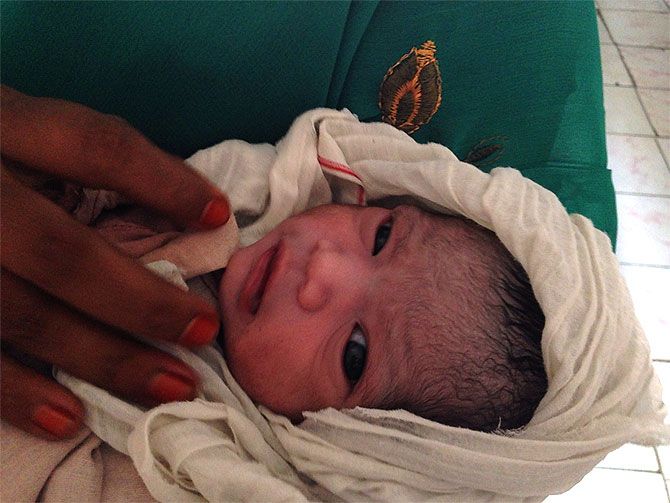
In a primary health centre in north Bihar, a group of women sit on the floor in the corridor, chatting listlessly. There are various messages of health painted on the walls.
"She has three girls. Laika naikhey (she doesn't have a boy). Laika howey ki chahin (she should deliver a son)," says a woman accompanying a mother-to-be who has been in labour for a few hours.
In the ward, a woman lies on the corner bed. There are two other women in the ward. One is in labour, restless she gets up, paces up and down for some time and lies down again. She is very young and is expecting her first child.
The other woman has delivered a baby a few hours ago and is being administered an intravenous drip. Her baby lies wrapped in a cloth on her side.
"Don't you have a cotton cloth to wrap the baby? Didn't Asha tell you all to bring suti kapda (cotton cloth)? The baby should be wrapped in cotton," a visiting senior health worker tells the mother.
The colour from the orange synthetic cloth has run into the soles of the baby's tiny feet.
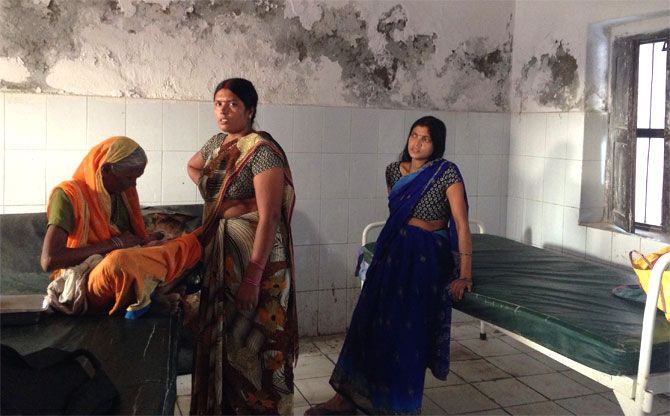
ASHA (an acronym for Accredited Social Health Activist) is a community health worker at the village level. She is entrusted with the task of informing women about pregnancy, vaccination and female health.
Asha is supposed to accompany the expectant mother to a primary health centre, and remain with her till the baby is delivered. For each birth, she is paid Rs 600.
But the woman who lies in the corner bed is not accompanied by Asha. She has been brought to the hospital by an old woman, a mooh boli chachi, and someone else that cannot be found -- and there is an emergency.
The baby is delivered before the patient can be shifted into the delivery room which is in another part of the hospital. The two rooms should have been side by side. The new ones being built have the two rooms together.
A nurse dashes in with a steel tray to place the newborn, wipes it and hands it to the old woman. The baby is fine, but the mother isn't. She has suffered post natal haemorrhage and needs a particular injection, but the hospital does not have it in stock.
This is a government facility which provides treatment free of cost, but since the injection is not available, the patient's relative has to buy it from the chemist opposite the hospital at his own cost. The old woman is illiterate and frail to do that -- and the young man who has come with her had gone off to have tea.
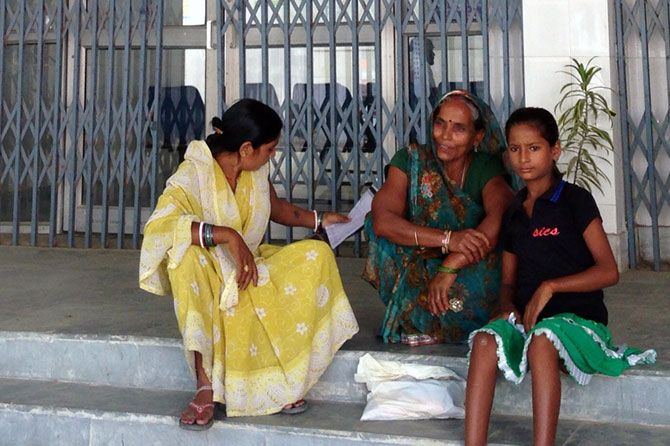
"Lamba saas kheecho aur dheela chhodo (take deep breaths and relax)", the nurse tells the patient who is in pain. An IV drip is placed and nurses peer over her bed. It is dark and someone opens the window by the bed to let the daylight in. There is no electricity, so the fan and lights are off.
There are three other beds in the room where patients and attendants go about their business. Women walk in and out. They are all from interior villages and have travelled a distance to come here. The only female staff cleaner is brooming the ward. Sometimes, I am told cleaners pick up medical waste without gloves.
A catheter is needed and is brought from the operation theatre, but takes time. By then one of the nurses has obtained the injection that was needed and it is administered. The nurse attending to her has been successful in stopping the bleeding -- and the woman is finally out of the woods.
She is in great pain, but has borne the agony with quiet dignity. Village women are known to be hardy during deliveries. Most start getting up and tying their petticoats an hour after the delivery to leave. "They don't fuss about it," says a young woman who works in rural healthcare.
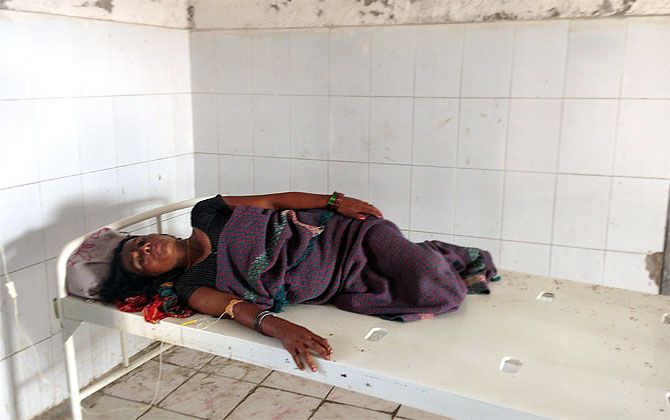
Most women leave in a few hours and are given Rs 1,400 by the state government at the time of discharge -- an incentive to encourage rural women to have a safe child birth in a hospital. In the event of a complicated delivery (a primary health centre does not perform C-sections), the patient is referred to a district hospital.
"There have been times that if the baby is not doing well, it is referred to the district hospital which is free, but they don't go. Or if it is too far, they will not go to a private doctor for fear of cost. They will just take the baby home even though the baby risks death," says a health worker.
The bed next to her is not occupied by a patient, but by someone who is holding her just delivered baby, wrapped in cloth. She removes the cloth to look between the infant's legs, and tells the old woman who has accompanied the new mother: "Laika baatey (it's a boy)."
The women outside are pleased that she has had a boy. An Asha, the village health worker, standing there says she has two girls, but wants a boy.
I wonder what kind of message she must give illiterate women with that attitude towards the girl child. I am told often nurses too share the same view. Ashas are also known to accompany pregnant women only to pocket the Rs 600 that is promised after the delivery and often don't provide the pre-pregnancy counselling to rural women as required of them.
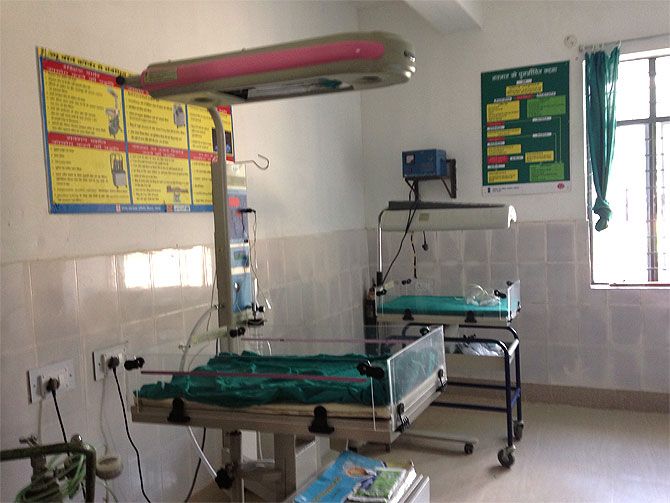
The primary health centre has several messages -- about cleanliness, diseases and several dos and don'ts -- painted on almost every wall. Equipment, medicines, money etc are provided for by the government -- even the colour of each bed sheet for hospital beds for each day is provided on the wall -- but it is the implementation where things don't go according to plan.
Cleanliness is far from what it should be. People who have experience in Bihar's rural care cite instances when floors have been caked with dust; doctors who have washed blood stained gloves with hot water and used the same for the next surgery; of nurses who do not know how to read blood pressure; and of doctors examining patients with paan in their mouths.
"The government is doing its job; it's the staff in the hospitals that are failing in doing theirs," says an NGO worker with experience in Bihar, Madhya Pradesh and Uttar Pradesh. "It's not as if things are much better in UP or MP, but unfortunately Bihar still has to pull itself up even it has to be at par with these two states."
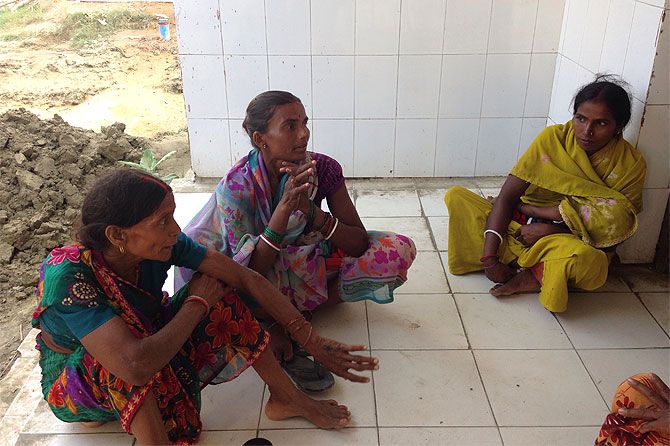
That evening the woman who had a complicated delivery leaves the hospital in a few hours. She walks out of the hospital with her fourth child in her arms as if the pain and the haemorrhage is just another part of bringing another baby into the world.
With the delivery now over, it is time to get on with life, just like it was before she left home today.
Almost 88.7 per cent of Bihar's population lives in rural areas.
According to UNICEF, the Maternal Mortality Ratio of Bihar is 219 per 100,000 live births, which is higher than the national average of 178.
Nearly half the girls (45.9 per cent) marry before the legal age of 18 in Bihar, against the national average of 22.1 per cent.










